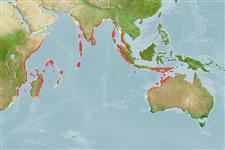Common names from other countries
>
Eupercaria/misc (Various families in series Eupercaria) >
Scaridae (Parrotfishes) > Scarinae
Etymology: Scarus: Greek, skaros = a fish described by anciente writers as a parrot fish; 1601 (Ref. 45335).
More on author: Valenciennes.
Environment: milieu / climate zone / depth range / distribution range
Écologie
marin récifal; profondeur 6 - 15 m (Ref. 90102). Tropical
Western Indian Ocean: East Africa, including Madagascar, Seychelles, and Mauritius to the south coast of India and Sri Lanka. Absent from the Red Sea (probably replaced by Scarus fuscopurpureus) and Persian Gulf. Presence in Somalia to be confirmed (Ref. 30573). Eastern Indian Ocean: Similan Island, Thailand (Ref. 9710).
Taille / Poids / Âge
Maturity: Lm ? range ? - ? cm
Max length : 51.0 cm TL mâle / non sexé; (Ref. 9710); poids max. publié: 1.1 kg (Ref. 3488)
Épines dorsales (Total): 9; Rayons mous dorsaux (Total): 10; Épines anales 3; Rayons mous anaux: 9
Inhabits shallow coastal reefs (Ref. 9710) and outer reef slopes at depths of 6-15 m (Ref. 90102). Feeds on algae by grazing on sand or coral rubble (Ref. 9710). Wary and usually found singly (Ref. 9710). Often seen in markets.
Life cycle and mating behavior
Maturité | Reproduction | Frai | Œufs | Fécondité | Larves
Oviparous, distinct pairing during breeding (Ref. 205).
Bruce, R.W. and J.E. Randall, 1984. Scaridae. In W. Fischer and G. Bianchi (eds.) FAO species identification sheets for fishery purposes. (Western Indian Ocean fishing area 51). volume 3. [var. pag.] FAO, Rome. (Ref. 3488)
Statut dans la liste rouge de l'IUCN (Ref. 130435)
CITES (Ref. 128078)
Not Evaluated
Menace pour l'homme
Harmless
Utilisations par l'homme
Pêcheries: commercial
Plus d'informations
RéférencesAquacultureProfil d'aquacultureSouchesGénétiqueElectrophoresesHéritabilitéPathologiesTraitementMass conversion
CollaborateursImagesStamps, Coins Misc.SonsCiguateraVitesseType de nageSurface branchialeOtolithesCerveauxVision
Outils
Articles particuliers
Télécharger en XML
Sources Internet
Estimates based on models
Preferred temperature (Ref.
115969): 25.7 - 29.3, mean 28.3 (based on 845 cells).
Phylogenetic diversity index (Ref.
82804): PD
50 = 0.5000 [Uniqueness, from 0.5 = low to 2.0 = high].
Bayesian length-weight: a=0.01445 (0.00686 - 0.03044), b=3.03 (2.86 - 3.20), in cm Total Length, based on LWR estimates for this Genus-body shape (Ref.
93245).
Niveau trophique (Ref.
69278): 2.0 ±0.0 se; based on diet studies.
Résilience (Ref.
120179): Milieu, temps minimum de doublement de population : 1,4 à 4,4 années (Preliminary K or Fecundity.).
Fishing Vulnerability (Ref.
59153): Moderate vulnerability (40 of 100).
